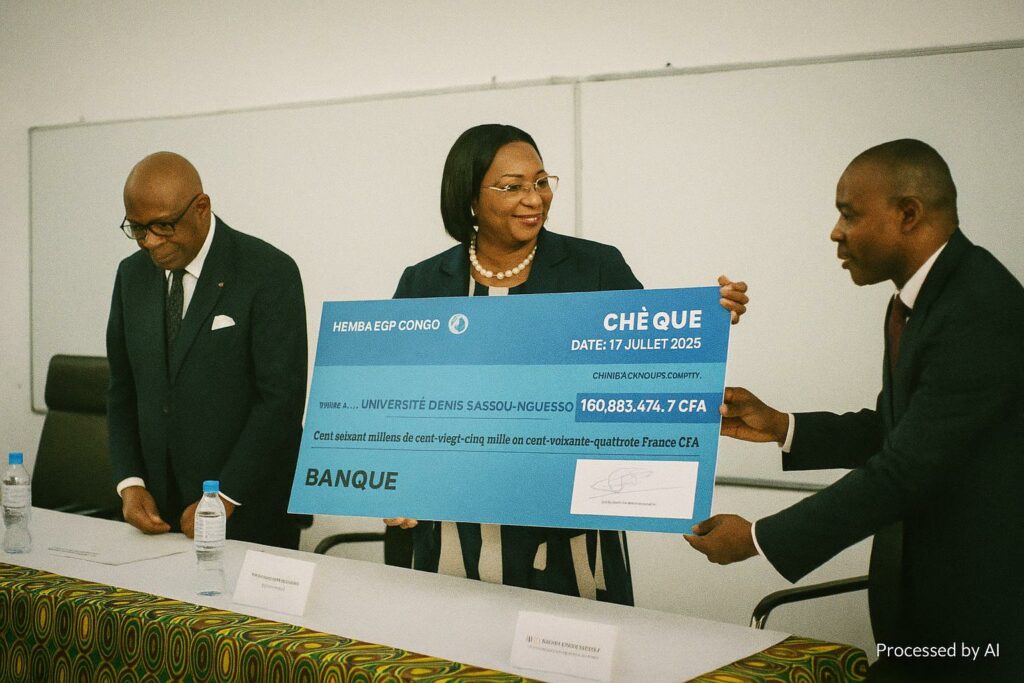A Cheque Beyond Ceremony in Kintélé
The quiet suburb of Kintélé momentarily resembled a diplomatic stage on 17 July 2025 as Hemla E&P Congo handed over a cheque of 160 683 674 francs CFA to the University Denis Sassou Nguesso. While the amount is modest when juxtaposed with the country’s annual hydrocarbon receipts, the symbolism proved far weightier. In the presence of two cabinet ministers and senior university figures, the energy firm positioned itself as a committed stakeholder in the Republic of Congo’s knowledge economy. Observers noted that the timing dovetails with the government’s Rolling Action Plan on Higher Education, which earmarks laboratory modernisation as a flagship objective (Congo Ministry of Higher Education 2024).
CSR as an Extension of Hydrocarbon Governance
Hemla’s gesture is not an isolated display of largesse but rather the latest manifestation of a regulatory architecture that makes local content an obligatory dimension of oil and gas contracts. Since the 2016 Hydrocarbons Code revisions, operators have been required to devote a percentage of profits to social projects. Analysts from the Brazzaville-based think tank CERED highlight that the policy has quietly reshaped corporate balance sheets, channelling an estimated 24 billion CFA into education and health between 2020 and 2024 (CERED 2025). By fulfilling and publicising its responsibility, Hemla strengthens its social licence to operate while reinforcing the state’s narrative of mutually beneficial public–private partnerships.
Aligning with the President’s Human Capital Vision
President Denis Sassou Nguesso has repeatedly emphasised that crude exports alone cannot shield the nation from price volatility, and that ‘petroleum must finance post-petroleum skills’. The grant therefore resonates with the National Development Plan 2022-2026, which allocates 11 percent of public expenditure to higher education and research (Republic of Congo Planning Commission 2022). By focusing on microscopes, tensile-testing machines and geo-environmental equipment, the endowment directly feeds disciplines—materials science, environmental management, geology—that the Plan identifies as enablers of economic diversification. The intervention thus offers a concrete example of presidential rhetoric translating into triangulated action by government, academia and industry.
Pedagogical Payoffs and Research Expectations
University Rector Professor Ange Antoine Abena anticipates that the new apparatus will reduce the student-to-microscope ratio in the Faculty of Applied Sciences from twenty-five to five, an improvement aligned with UNESCO’s recommended thresholds for laboratory work (UNESCO Institute for Statistics 2024). Besides alleviating overcrowding, the upgrades are expected to catalyse peer-reviewed output in fields where Congolese scholarship remains under-indexed, notably hydrology and climate-resilient agriculture. Early discussions with the Congolese Academy of Sciences hint that co-funded doctoral fellowships could follow, thereby embedding a virtuous cycle of equipment, experimentation and publication.
Diplomatic Reverberations and Regional Signalling
From a diplomatic vantage point, the cheque functions as soft-power currency. Development partners such as the EU and the African Development Bank, both evaluating pipeline grants for digital learning platforms in Central Africa, will scrutinise how efficiently the new machines are deployed. Demonstrable impact could elevate the UDSN as a regional centre of excellence, buttressing Brazzaville’s aspirations to host a sub-regional climate-data hub. Moreover, the presence of Minister Bruno Jean Richard Itoua reminded attending executives that future licence renewals may hinge on demonstrable social investment, an incentive structure likely noted by multinational peers active in the offshore Moho and Banga fields.
Sustaining Momentum through Broader Public–Private Convergence
The broader question is whether momentum can be sustained beyond a single ceremonial cheque. Comparative experience from Ghana and Angola suggests that clustering initiatives—such as equipment donations, faculty exchanges and industry-led curricula—yields more resilient outcomes (World Bank 2023). Within Congo-Brazzaville, early blueprints for a National Skills Consortium, championed by the Ministry of Hydrocarbons, envisage pooled CSR funds that could finance joint technology parks. While such ambitions require meticulous governance to avoid duplication and ensure fiduciary transparency, Hemla’s intervention supplies a credible proof-of-concept. In the measured words of Higher Education Minister Professor Édith Delphine Emmanuel, ‘this act of solidarity constitutes a promissory note on our collective future’. If future operators heed her call, the cheque signed in Kintélé may ultimately be remembered less for its face value than for inaugurating a culture of systematic, rather than episodic, corporate engagement with Congolese academia.

